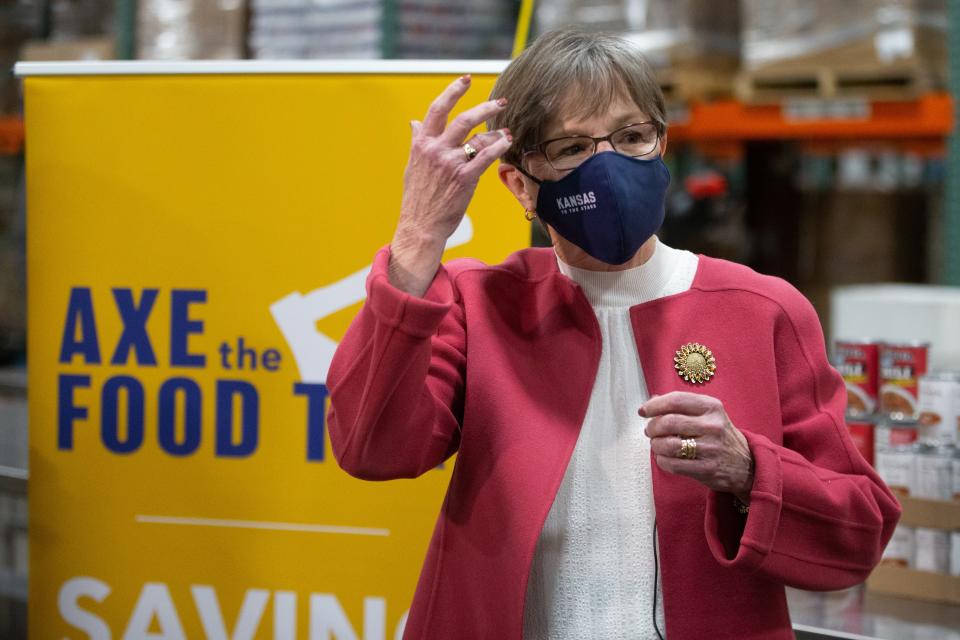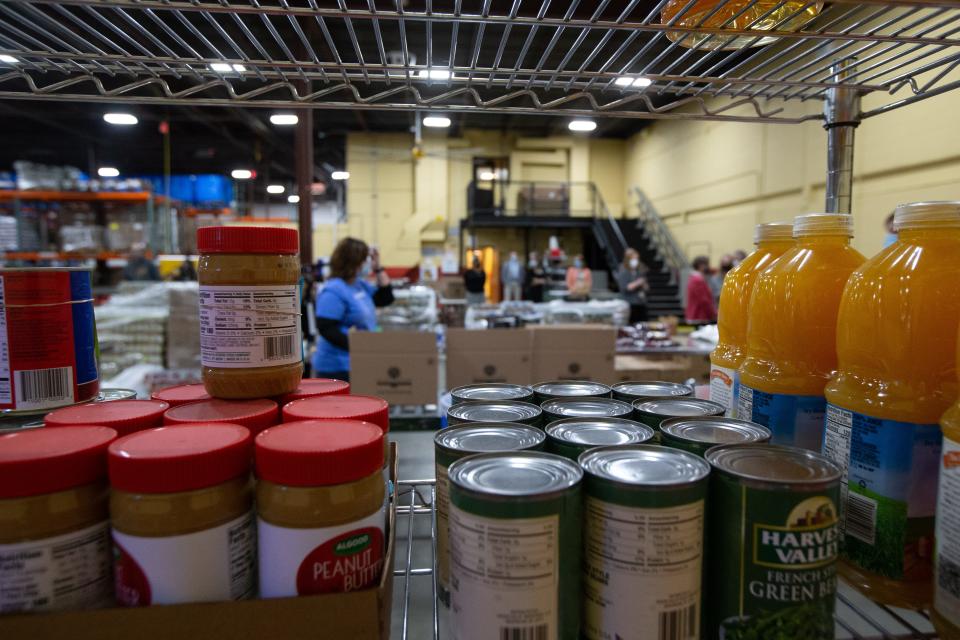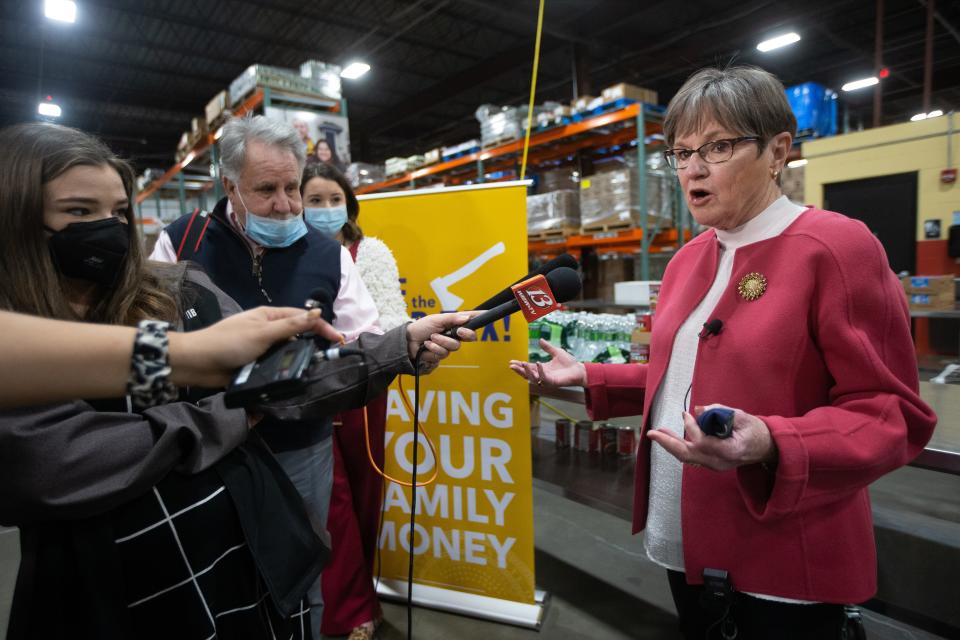Is a food sales tax cut compromise in the works? Kansans 'need to be contacting their legislators'
- Oops!Something went wrong.Please try again later.
Kansas lawmakers are running into a time crunch if they want to cut the state's 6.5% sales tax on food in time for consumers to start saving money this summer.
"Now's the time for people out there, if they really want this, they need to be contacting their legislators," said Rep. Jim Gartner, D-Topeka. "Either by phone or by email and letting them know to axe the tax. We want to get it down to zero."
Gov. Laura Kelly has ratcheted up the public pressure on lawmakers to axe the food tax with public events, media releases, newsletters and social media posts.
"I'm sure her frustration, and my frustration, too, if I was in her shoes, was this was proposed early on," said Rep. Adam Smith, R-Weskan. "And here it is March already, and there hasn't been any movement on it. So I'm sure she's just trying to maybe do that to put a little pressure on the Legislature to get moving."

Smith, who chairs the House Tax Committee, said the governor's pressure isn't working.
"I'm trying to be very methodical and thoughtful about the process," he said.
More: Food sales tax cut bill misses governor's Kansas Day deadline. What's the holdup?
Lawmakers have found broad bipartisan support to doing something, but they have yet to agree on how to tackle the issue. The governor is aware that she doesn't hold the purse strings.
"I do work behind closed doors, as you well know, with legislators," Kelly told reporters after an event at Harvesters Community Food Network in Topeka. "So we will continue to have discussions to get this where it's doable and it has the greatest impact on working families across the state."
Multiple bills about food sales tax cuts have had hearings
Smith said the tax committee will likely work a bill this coming week, though he isn't sure which one they will use as a starting point. He expects amendments, regardless of what bill serves as the starting point.
"I'm optimistic that we're going to get something out of House Tax (Committee) this next week," Gartner said. "I'm not sure what it's going to look like."
The Democrat plan and Smith's plan are the most likely, though, at least five versions have had hearings.
HB 2487 is the plan from Kelly and House Democrats. It had 43 co-sponsors, including a handful of Republicans. Smith introduced his own plan in HB 2711.
Rep. Ken Corbet, R-Topeka, introduced HB 2484, and Rep. Dave Baker, R-Council Grove, introduced HB 2720.
Kelly has called for a "clean" bill that focuses solely on the grocery tax. A Senate tax committee advanced SB 339, which started with a food sales tax cut but added on several other proposals. The full chamber hasn't touched the bill.
Smith called the Senate version "a little unattainable" due to its fiscal cost, which is roughly $864 million a year.
Eliminating the sales tax on groceries would cost the state roughly $500 million a year in revenue. A family of four could expect to save an estimated $500 a year when checking out at the grocery store.
Paying for the tax cut

Kansas appears to have the money to afford such a substantial cut to revenue. State coffers are flush with a $3 billion-plus budget surplus. But much of that surplus could soon be wiped away.
The APEX economic development incentive deal, if successful in attracting the megaproject, would mean $1.2 billion-plus in tax credits over several years. Lawmakers and advocates have split over whether such a large government investment in securing a private company to come to Kansas makes it prudent to hold off on cutting taxes.
More: The race is on for a mystery megaproject. Will that doom efforts to eliminate the food sales tax?
"Kansas Action for Children is disappointed that full elimination, which can help Kansans pay for groceries, is not currently prudent while ensuring that the state maintains its fiscal health in the long term," said the organization's Emily Fetsch.
KAC is now backing the Smith plan after previously supporting the Democrat plan. That drew the ire of Rep. Stephanie Clayton, D-Overland Park, who said she was "very disappointed." Fetsch explained that she fears budget cuts could hurt low-income families.
Some legislators want to wait on making cuts
Such arguments swayed Rep. Henry Helgerson, D-Eastborough, who suggested waiting to see if revenue windfalls stabilize.
"Maybe we'd be prudent to delay some of these big tax in spending ideas for one year," Helgerson said.
"The money is there," said Gartner, the Topeka legislator. "I just don't know what people are concerned about."
Smith said the state has the money to afford the tax cut now, but there is no guarantee for the fiscal situation 10 years from now. He likened it to the years of budget cuts brought on by former Gov. Sam Brownback's tax cuts.
"I don't want to go back there," he said. "That's the only reason I'm trying to be cautious on moving forward."
Kelly has dismissed fiscal concerns.
"I want the axe the food tax done, and I want it sent to my desk clean," she said. "This has been completely and totally vetted budgetarily. So we know that we can afford this now and we can sustain that cut."
The state's budget surplus continues to grow. February tax collections were $18.7 million above the estimate. The governor points to healthy revenue figures as evidence the state can sustain putting "money back into the pockets of Kansas taxpayers."
"My administration has taken steps to restore the Kansas economy, and that fiscal responsibility has paved the way to provide direct tax relief to Kansans," Kelly said.
Policy questions unresolved

The definition of food will be a key area and would significantly affect the price tag.
Inclusion of restaurant meals and other prepared food would be costly. Restaurant lobbyists have argued that all food should be treated the same.
The Department of Revenue's fiscal notes have assumed that 15% of all sales tax revenue is collected on food. If restaurant food is included, that figure rises to 24%, raising the annual cost of a tax cut by roughly $296 million.
A proposal to limit the tax cut to only food that is eligible for food stamps would have little effect on the cost to state revenue, but it would put the state out of compliance with the Streamlined Sales and Use Tax Agreement. That could have an unintended consequence of risking $60 million in annual revenue.
Lawmakers must choose a start date for a tax cut. Democrats have wanted a July 1 start date, but they are running short on time to make it work.
The Kansas Department of Revenue needs 60 to 90 days; it has to give retailers at least 30 days notice for a rate change, the agency's Kathleen Smith said. Additionally, a change has to go into effect at the start of a calendar quarter.
They have to decide how big the cut should be and how fast. Democrats have pushed for cutting the 6.5% tax rate to zero immediately.
The Smith plan would cut it by 3% now, then allow the rate to ratchet down over four years based on cash reserves in the state's rainy day fund. Such a mechanism could also be implemented without strings attached.
Advocates for taking it to 0% have argued that it would help offset inflation.
Washburn University, KDOT could lose funding
There are also questions of whether to hold other entities harmless. The state highway fund stands to lose about $52 million a year if distribution formulas aren't changed. Washburn University could stand to lose up to $4 million a year.
Lawmakers must also resolve what to do with the existing nonrefundable food sales tax credit. Competing plans have called for either making the credit refundable or eliminating it entirely.
None of the proposals would fully exempt food from all sales taxes. That technicality allows city and county governments to continue taxing food. Local government advocates have said a loss in revenue from taxing groceries would likely lead to higher property taxes.
There is also a proposal to fully exempt farmers market food from all sales taxes.
Lawmakers will also have to decide whether other tax plans should be included, such as a reduction in the overall sales tax rate.
Negotiations now may not ultimately matter much if the House and Senate can't agree on the same version — assuming a bill makes it that far. A conference committee of a handful of select legislators from both chambers would hammer out the details without an opportunity for broader input, as lawmakers are wont to do on budget bills.
Jason Tidd is a statehouse reporter for the Topeka Capital-Journal. He can be reached by email at jtidd@gannett.com. Follow him on Twitter @Jason_Tidd.
This article originally appeared on Topeka Capital-Journal: Laura Kelly renews pressure on Kansas lawmakers to cut food sales tax

